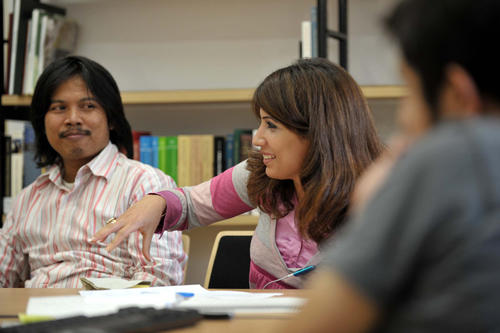Knowledge about the Islamic World
Doctoral students at the Berlin Graduate School of Muslim Cultures and Societies
Image Credit: Bernd Wannenmacher
What makes the “Islamic world” Islamic? What influence does Islam have on culture, law, and politics in societies we call “Muslim” or “Islamic”? These are the key issues investigated at the Berlin Graduate School of Muslim Cultures and Societies.
News from Mar 17, 2015
Training is provided for young scholars working on the internal diversity, historical variability, and global networking in Muslim cultures and societies. The doctoral students from around the world have background in different disciplines in the humanities and social sciences.
The regions they investigate include the Middle East, the Maghreb and sub-Saharan Africa, Central, South and Southeast Asia, and the Muslim diaspora in Europe and North America. What the various research projects have in common is that they all have Islam as a frame of reference for religious, cultural, and social phenomena.
The Berlin Graduate School of Muslim Cultures and Societies was selected for funding in the German Excellence Initiative in 2007 and again in 2012. It will continue to be funded through this initiative through 2017. The graduate school cooperates with Humboldt-Universität zu Berlin and the Zentrum Moderner Orient in Berlin. It accepts up to 15 doctoral students and six postdocs each year.
More than 20 scholars from different research institutions in Berlin and visiting scholars from home and abroad are involved in training them. The well-founded academic training and the practical skills they acquire in the program make graduates highly qualified to take on management positions in academia, media, public policy, and cooperative cultural and economic enterprises and ventures.
Besides the Berlin Graduate School of Muslim Cultures and Societies, Freie Universität is home to six other graduate schools funded through the German Excellence Initiative:

